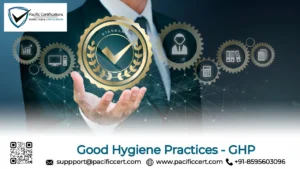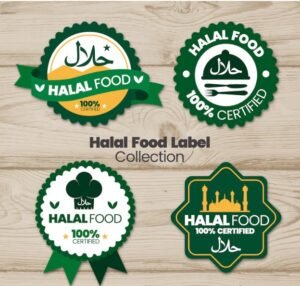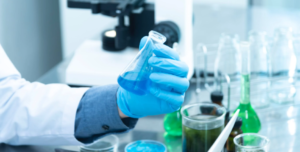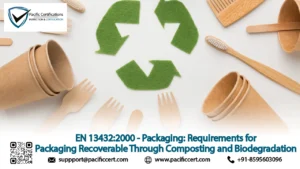What is GMP (Good Manufacturing Practices)?

Good Manufacturing Practices (GMP) are a set of guidelines and regulations designed to ensure that products, particularly in the pharmaceutical, food, cosmetics, and medical device industries, are consistently produced and controlled according to quality standards. GMP encompasses all aspects of production, from raw materials to final products, including the manufacturing environment, equipment, personnel, and processes.
The goal of GMP is to minimize the risks involved in any production process that cannot be eliminated through testing the final product. GMP is critical for ensuring that products are safe, effective and of high quality. Compliance with GMP helps companies meet regulatory requirements and provides assurance to consumers and stakeholders about the integrity of the products.
For more information, contact us at support@pacificcert.com.
Purpose of GMP
The purpose of GMP is to ensure that manufacturing processes are designed, implemented, and monitored in a way that guarantees the quality, safety, and consistency of products. GMP standards aim to prevent contamination, errors, and defects in the production process, which could affect product safety and efficacy. It establishes a clear framework for best practices and ensures that these are consistently followed across all manufacturing stages.

Adopting GMP guidelines ensures that products are consistently produced under controlled conditions, which is particularly important for industries such as pharmaceuticals and food production, where the safety of the consumer is paramount.
Scope and Applicability
GMP applies across various industries, particularly those that produce consumable goods or products that have a direct impact on consumer health and safety. These industries include:
GMP Certifications ensure medicines are produced consistently with high quality and meet safety standards. It tells us if the food products are safe for consumption and free from contaminants. Also ensures cosmetics and personal care products are safe and free from harmful substances. It makes sure that devices are manufactured safely and perform as intended. GMP guidelines are applicable to all levels of the manufacturing process, from raw material handling and storage to production, packaging, and distribution.
Key Definitions
- Good Manufacturing Practices (GMP): A system for ensuring that products are consistently produced and controlled according to quality standards.
- Quality Control (QC): The process of ensuring that the products meet required specifications and are free from defects and contamination.
- Quality Assurance (QA): The activities aimed at ensuring that the manufacturing process is conducted in a controlled manner and that the final product meets quality standards.
- Batch Production: A production process in which products are produced in groups or batches rather than in a continuous flow.
The Role of Technology in GMP
In the modern manufacturing environment, technology plays a vital role in ensuring GMP compliance. The integration of digital systems and tools allows manufacturers to monitor, record, and track every aspect of the production process, ensuring that all procedures are followed precisely. Here are a few key technological advancements that support GMP:
Automated systems help reduce human error, increase production efficiency, and ensure the consistency of product quality. Sensors and IoT devices can be used to track environmental conditions such as temperature, humidity, and pressure during production, ensuring that these parameters remain within the required limits. Data collection and analysis tools provide valuable insights into production processes, helping identify trends and areas for improvement. The use of blockchain for product traceability improves transparency in the supply chain, making it easier to track raw materials and finished products, thus ensuring GMP compliance across the entire production process.
Adopting these technological solutions improves manufacturing operations, improves compliance with GMP standards, and boosts the overall efficiency of the production process.
What are the Requirements of Good Manufacturing Practices?
Before implementing GMP, organizations must ensure they comply with a set of defined guidelines to maintain a controlled environment. Key requirements include:

- All GMP-related activities, including manufacturing processes, inspections, and audits, must be thoroughly documented.
- A strong QMS should be in place to monitor and manage every step of the manufacturing process, ensuring quality and compliance.
- All employees involved in the manufacturing process must be trained on GMP standards and practices.
- Manufacturing facilities must maintain a high level of hygiene, and all equipment must be properly maintained to avoid contamination.
- Raw materials and products must be managed carefully to ensure they meet quality standards and are stored appropriately.
- Ongoing monitoring and testing of products, processes and equipment must be conducted to ensure compliance with GMP standards.
For more information, contact us at support@pacificcert.com.
Key Principles of Good Manufacturing Practices
It helps in implementing a strong quality management system to monitor and manage the quality of products at every stage of production. Ensures that the manufacturing environment is clean, sanitized and free from contamination risks, It also ensures that staff are adequately trained and aware of the critical importance of quality and hygiene in the manufacturing process.
It keeps in mind that all materials and products are traceable from raw material to final product, enabling effective recall management if needed. It ensures that all procedures are validated and properly documented to show compliance with GMP standards.
What are the benefits of Good Manufacturing Practices?
GMP certification offers numerous benefits for companies that manufacture products in regulated industries. The benefits of GMP certification include:
- Certification ensures that products are consistently manufactured to high-quality standards, reducing defects and enhancing consumer safety.
- GMP certification assures consumers that the products they use are safe, reliable, and manufactured according to strict quality standards.
- GMP certification helps organizations meet regulatory requirements imposed by national and international authorities, avoiding fines and penalties.
- Implementing GMP helps streamline operations, reduce waste, and increase productivity by optimizing production processes.
- GMP certification opens up global markets by demonstrating compliance with international standards, allowing businesses to expand their reach.
Market Trends
Recent trends indicate an increasing emphasis on automation and digitalization within GMP environments. Many manufacturers are adopting digital solutions to improve traceability, compliance reporting and real-time monitoring of production processes. Data-driven decision-making is becoming a core part of the GMP landscape, allowing companies to quickly identify issues and improve operational efficiency. As industries continue to face increasingly stringent regulatory requirements and rising consumer demand for transparency and quality, the demand for GMP certification is expected to grow significantly in the recent years. This trend is particularly pronounced in emerging markets, where governments are ramping up regulations to meet global standards for safety and quality.
Certification Process for GMP
The certification process for GMP typically includes the following stages:
- Initial Assessment: Organizations conduct an internal review of their processes to ensure they are in alignment with GMP standards.
- Audit Preparation: Companies prepare the necessary documentation, including quality management policies and operational procedures.
- Stage 1 Audit: A preliminary audit is conducted to assess readiness and identify any gaps or non-compliance issues.
- Stage 2 Audit: A full audit is conducted to review the organization’s adherence to GMP practices, including documentation, personnel, and operational processes.
- Certification Awarded: Upon successful completion of the audit, GMP certification is awarded.
- Surveillance Audits: Regular surveillance audits ensure ongoing compliance with GMP standards, typically occurring annually or biannually.
Timeline for GMP Certification
The timeline for GMP Certification certifications spans several months. The pre-assessment and preparation phase generally takes 1-2 months, during which the organization reviews its current processes and makes necessary adjustments. The Stage 1 audit lasts about 1 month, focusing on documentation and readiness. The Stage 2 audit, which involves a overreaching review of processes and software development practices, takes 1-2 months. Certification issuance happens within 3-6 months, depending on the audit findings and the organization’s readiness for certification.
What is the cost of GMP Certification?
The cost of GMP certification varies based on the size of the organization, the complexity of operations, and the number of locations involved.
Audit fees is the fee for the certification body’s audit process. Training Costs are the costs for educating staff on GMP certification and the necessary processes to comply with the standard. Ongoing maintenance is cost for regular audits, recertification, and maintaining compliance every 3 years.
How Pacific Certifications Can Help for Good Manufacturing Practices audit?
At Pacific Certifications, we provide overreaching auditing and certification services for Good Manufacturing Practices. Our team will guide you through the entire certification process, ensuring your manufacturing processes meet the highest standards. Our services include for Good Manufacturing Practices audit:
- Stage 1 and Stage 2 audits to evaluate your manufacturing processes and quality management systems.
- Objective conformity assessments based on GMP standards.
- Certification issuance upon successful completion of the audit.
- Ongoing surveillance audits to ensure continued GMP compliance.
- Support for multi-site or global operations.
For audits and certification, contact support@pacificcert.com.
ISO 9001 and Good Manufacturing Practices Training and Courses
Various training courses are available to help organizations comply with GMP, including:
- Lead Auditor Training – Equips professionals to conduct external third-party audits.
- Lead Implementer Training – For those responsible for planning and executing ISO 9001.
- Internal Auditor Training – Preparing internal auditors for certification audits
Pacific Certifications provides accredited training programs. If your organization is looking for good Manufacturing Practices Training, our team is equipped to help you. Contact us at support@pacificcert.com.
Frequently Asked Questions (FAQs)
How long does it take to get GMP certification?
The certification process typically takes 3–6 months, depending on your organization’s preparedness and audit outcomes.
Is GMP certification mandatory for all manufacturers?
GMP certification is not mandatory, but it is highly recommended for businesses in industries like pharmaceuticals, food, and cosmetics to ensure product safety and regulatory compliance.
What are the main benefits of GMP certification?
Certification ensures product quality, reduces risks, meets regulatory compliance, and boosts consumer confidence.
Can I apply for GMP certification without a formal QMS in place?
No, a formal QMS must be established before applying for GMP certification to ensure compliance with GMP standards.
How often do I need to renew GMP certification?
GMP certification is valid for three years, after which recertification is required.
Ready to get ISO certified?
Contact Pacific Certifications to begin your certification journey today!
Suggested Certifications –
Read more: Pacific Blogs






